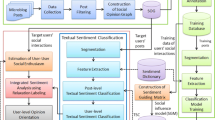Abstract
Microblogging has become an increasingly popular platform for users to post their views and comments online due to the ease of posting and replying. This generated an abundance of sentiment database which could be used to study the-day-of-the-week sentiment patterns of users. We adopted sentiment database to extract sentiment expressions from the posted Plurk messages to investigate whether there are sentiment fluctuations in the days of a week and if there are opportunities to use the-day-of-the-week sentiment patterns to maximize the effectiveness of sentiment-based product recommendation. The experimental results showed that users’ posts are significantly strong negative on Monday and strong positive on Friday, Saturday, and Sunday. We speculate that the recommended products with positive sentiment words were more effective during Monday and Saturday because of the approach-avoidance motivation. People would usually have negative sentiment after 5 days continuous work during Friday working hours, so that recommended products with negative sentiment words are more effective. Whereas on Friday night the positive sentiment increased after off duty, and caused the recommendation products with positive sentiment words more effective. Negative sentiment on Sunday due to the coming blue Monday may cause negative sentiment recommendations more effective.
Access this chapter
Tax calculation will be finalised at checkout
Purchases are for personal use only
Similar content being viewed by others
References
Aggarwal, R., Rivoli, P.: Seasonal and day-of-the-week effects in four emerging stock markets. Financ. Rev. 24(4), 541–550 (1989)
Baumeister, R.F., Vohs, K.D., DeWall, C.N., Zhang, L.: How emotion shapes behavior: feedback, anticipation, and reflection, rather than direct causation. Pers. Soc. Psychol. Rev. 11(2), 167–203 (2007)
Christie, M.J., Venables, P.H.: Mood changes in relation to age, EPI scores, time and day. Br. J. Soc. Clin. Psychol. 12(1), 61–72 (1973)
Chuo, S.-L., Chen, C.-C., Tseng, J.-Y.: Chinese emotions and related psychophysiological data in Taiwan. Chin. J. Psychol. 55(4), 439–454 (2013)
Cross, F.: The behavior of stock prices on Fridays and Mondays. Financ. Anal. J. 29(6), 67–69 (1973)
Elliot, A.J., Thrash, T.M.: Approach-avoidance motivation in personality: approach and avoidance temperaments and goals. J. Pers. Soc. Psychol. 82(5), 804 (2002)
Farber, M.L.: Time-perspective and feeling-tone: a study in the perception of the days. J. Psychol. 35(2), 253–257 (1953)
French, K.R.: Stock returns and the weekend effect. J. Financ. Econ. 8(1), 55–69 (1980)
Froggatt, P.: Short-term absence from industry: I Literature, definitions, data, and the effect of age and length of service. Br. J. Ind. Med. 27(3), 199–210 (1970)
Glance, N., Hurst, M., Tomokiyo, T.: Blogpulse: automated trend discovery for weblogs. In: WWW 2004 workshop on the weblogging ecosystem: aggregation, analysis and dynamics, Vol. 2004 (2004)
Keim, D.B., Stambaugh, R.F.: A further investigation of the weekend effect in stock returns. J. Finance 39(3), 819–835 (1984)
Lazarus, R.S.: A cognitively oriented psychologist looks at biofeedback. Am. Psychol. 30(5), 553 (1975)
Logunov, A., Panchenko, V.: Characteristics and predictability of Twitter sentiment series. In: 19th International Congress on Modelling and Simulation, pp. 1617–1623 (2011)
Mishne, G., Glance, N.S.: Predicting movie sales from blogger sentiment. In: AAAI Spring Symposium, Computational Approaches to Analyzing Weblogs, pp. 155–158 (2006)
O’Connor, B., Balasubramanyan, R., Routledge, B.R., Smith, N.A. (2010). From tweets to polls: linking text sentiment to public opinion time series. ICWSM, 11(122–129), pp. 1–2
Pecjak, V.: Verbal synesthesiae of colors, emotions, and days of the week. J. Verbal Learn. Verbal Behav. 9(6), 623–626 (1970)
Rogalski, R.J.: New findings regarding day-of-the-week returns over trading and non-trading periods: a note. J. Finance 39(5), 1603–1614 (1984)
Rystrom, D.S., Benson, E.D.: Investor psychology and the day-of-the-week effect. Financ. Anal. J. 45(5), 75–78 (1989)
Schumaker, R.P., Zhang, Y., Huang, C.N., Chen, H.: Evaluating sentiment in financial news articles. Decis. Support Syst. 53(3), 458–464 (2012)
Schwarz, N., Clore, G.L.: Feelings and phenomenal experiences. Social Psychol.: Handb. Basic Principles 2, 385–407 (1996)
Stone, A.A., Hedges, S.M., Neale, J.M., Satin, M.S.: Prospective and cross-sectional mood reports offer no evidence of a “blue Monday” phenomenon. J. Pers. Soc. Psychol. 49(1), 129 (1985)
Tomkins, S.S.: Affect, imagery, consciousness: Vol. I: The positive affects (1962)
Tumasjan, A., Sprenger, T.O., Sandner, P.G., Welpe, I.M.: Predicting elections with twitter: what 140 characters reveal about political sentiment. ICWSM 10, 178–185 (2010)
Wegener, D.T., Petty, R.E.: Mood management across affective states: the hedonic contingency hypothesis. J. Pers. Soc. Psychol. 66(6), 1034 (1994)
Westbrook, R.A.: Product/consumption-based affective responses and post-purchase processes. J. Mark. Res., pp. 258–270 (1987)
Author information
Authors and Affiliations
Corresponding authors
Editor information
Editors and Affiliations
Rights and permissions
Copyright information
© 2017 Springer International Publishing AG
About this chapter
Cite this chapter
Weng, S.Y., Hsu, P.Y., Cheng, M.S., Nguyen, PAH. (2017). The Impact of User Sentiment Aroused by The-Day-of-the-Week on the Recommendation Effectiveness in Microblog. In: Król, D., Nguyen, N., Shirai, K. (eds) Advanced Topics in Intelligent Information and Database Systems. ACIIDS 2017. Studies in Computational Intelligence, vol 710. Springer, Cham. https://doi.org/10.1007/978-3-319-56660-3_31
Download citation
DOI: https://doi.org/10.1007/978-3-319-56660-3_31
Published:
Publisher Name: Springer, Cham
Print ISBN: 978-3-319-56659-7
Online ISBN: 978-3-319-56660-3
eBook Packages: EngineeringEngineering (R0)




